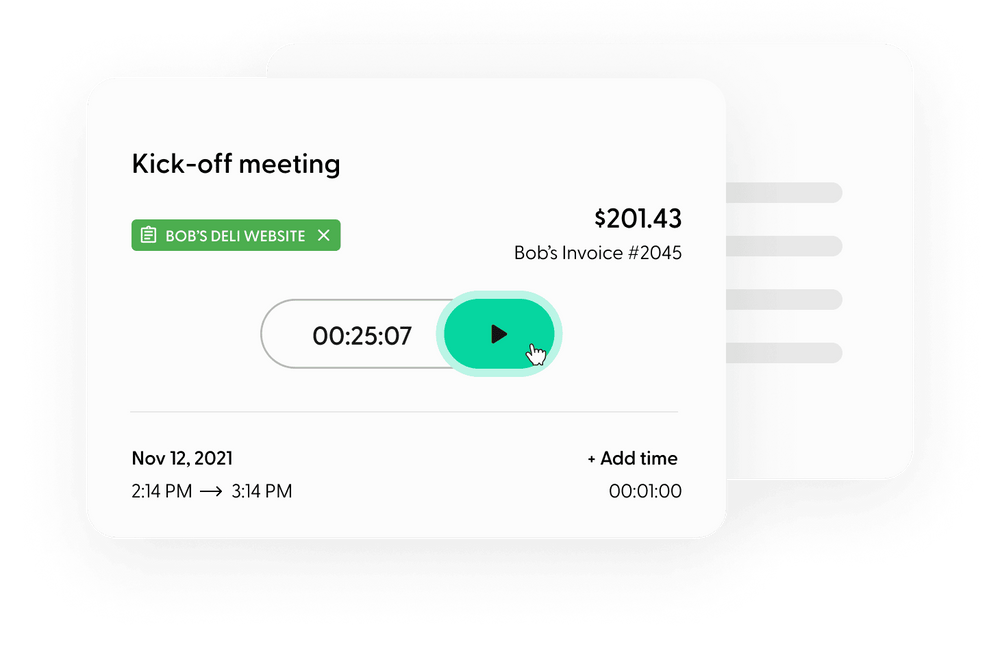Did you know that 61% of individuals admit to wasting 30 to 60 minutes on a daily basis? This doesn't sound like a staggering number until we look at the big picture. For a freelancer or a small business owner, even 30 minutes a day adds up to 2.5 hours per week and 130 hours per year. And 130 hours is a staggering number!
One of the primary reasons why people tend to waste so much time is that they are unable to manage it efficiently. In this blog, we'll lay out and elaborate on the top 7 strategies for successful time management and even stress management. So make sure you read till the end.
The 7 effective time management strategies
Time management is a critical skill that can make a big difference in your productivity, effectiveness, and overall quality of life. Here are 7 strategies to help you manage your time more effectively.
Delegation
Delegation involves transferring responsibility to another person and lets you focus on important work. These routine tasks are usually the ones that either:
- Consume a lot of your time
- Or involve work in which you don't have expertise in
Identify a task others could do as well as you (preferably better) and select someone for it. Select people with the appropriate skills, expertise, interests, and authority required for the task. Get specific.
Define and explain the task and your expectations while giving the person the option of personalizing their own tasks. Check that the person has progressed regularly and offer assistance with caution. Ultimately, give appropriate compensation to the person(s) for their work.

For example, you are a content writer who settles their accounts at the end of each week. This settlement and accounting of multiple invoices can wipe off a few hours from your weekends. For such purposes, you can hire an accountant who can handle these things for you at a reasonable rate.
This will free up your schedule and allow you to focus on other things, such as rest, etc. Another benefit that delegation brings with it is that it's tax deductible. You can reduce your overall taxes by showing your delegation costs as business expenses.
Moreover, if you plan to convert your solo freelancing business into a lucrative, scalable company, you need to master delegation. All businesses that started small experienced growth when they realized the importance of delegation and started recruiting employees to delegate different tasks.
Hence, as a future CEO, you should try to spend 100% of your time on things that generate revenue and profits. Other things could be delegated without much thought.
Prioritization
How do I manage my time? Freelancers often question themselves. Experts agree that the most urgent tasks in the world are often not the most essential tasks in the world. We tend to let our urgency dictate our daily life.
Eisenhower Matrix technique:
Before Eisenhower became President in 1953, he was an Allied forces commander in WWII. He had to face difficult decisions on a daily basis. To deal with this, he invented what is referred to in the modern term as the Eisenhower Time Management Matrix.
How this works: You have to divide the tasks into four sections arranged by importance: important, unimportant, urgent, or not urgent. The most urgent and important task should get immediate attention. Important tasks are those that support long-term goals and values. Ideally, your task should be completed within one quadrant; other duties must be delegated or perhaps even deleted.
Pickle Jar Theory
It helps to determine the usefulness of a given task and its potential impact. You can set up tasks and prioritize your day according to time. How it works: Imagine a pickled jug filled with sand, pebbles, and rocks. The sand is the representation of less important tasks and distractions that takes up space between the rock and pebbles. Pebbles are less urgent but important tasks.
Make a list of all the tasks you need to complete during the day. Make a list of tasks starting with rocks and ending with sand whenever needed. Give a realistic estimate of the time needed for each. There is a little extra space (time) between sand and pebbles that you can dedicate to other things.

Parkinson's law
Cyril Northcote Parkinson was known for his Parkinson's law that "work expands so as to fill the time available for its completion." The amount of time you give yourself to complete certain tasks is how long it'll take to complete tasks. You may ask, "How can I use this as an effective time management technique?"
Let's say the deadline for your project is one week. Now, instead of taking one whole week to complete this project, ask yourself if you can do it in five days. No? Six days? If yes, then set your own deadline as six days instead of one week. If you try hard and are successful, you'll get 24 hours' worth of time added to your schedule. You can use this time for a number of things. In essence, this method will enable you to work faster in shorter intervals.
Scheduling
Scheduling is simply planning and tracking what needs to be done in a specific time slot. Keep everything in its place whenever possible. A good plan involves understanding one's specific tasks and the time it'll take to complete them. Prepare for your challenges with maximum energy. Make it difficult to spend time doing unessential things and avoid interruptions. Schedule small tasks such as writing emails and creating lists for commutes or while awaiting a call or appointment.
Start your day with a planned schedule
In order to achieve a poised work-life balance, you must plan your daily schedule. The first step is to determine the most productive hours in your entire day. Then make a list and write down everything that needs to be prepared for work. It's not the most innovative way for someone to organize, but it can really improve their productivity and efficiency in their daily tasks. Each time you complete one task on your to-do list, ensure that it's marked as completed by crossing it off.

Incorporate the Pomodoro Method into your schedule
The Pomodoro Technique is another leading time management strategy that promotes 25-minute time slots of focused work followed by 5-minute breaks. A longer break, generally 15 to 30 minutes, can be taken after four consecutive work intervals.
Work management
Mastering time management is nothing more than mastering work management. Psychological studies showed that completing multiple tasks concurrently isn't time-efficient. Generally speaking, that’s the opposite. Juggling and frequent changes in tasks reduce productivity. Routine multitasking can be difficult when retaining focus.
Leave the emails and calls for later
Making phone calls or sending emails at inappropriate times can cause unavoidable delays and missed deadlines. When people devote certain time blocks to their emails and calls, productivity rises to a whole new level.
Now, we agree that getting accustomed to this habit will take time, but when you learn to dedicate a particular time block for each task, you'll be left with plenty of time. Make a specific period in your schedule for checking the mail or making a call.
Know when to say NO to meetings
Meetings, if not organized and scheduled properly, can be the biggest enemy of your schedule. According to Forbes, over 70% of the meetings are not fruitful and can chop down hours from your busy schedule. Thus, make sure that you organize and plan meetings effectively while ensuring that they don't last longer than a certain duration.
No procrastination
Some people deliberately delay doing something, even though they know that doing so can have its own consequences. This may seem ironic, but it's a real fact. This probably happens because people feel that a task or a project is too daunting or difficult. But, as ancient wisdom says, "There is never an easy time to make a hard decision." This statement stands true in all situations that look difficult but MUST be completed.
The bottom line is that instead of over-analyzing, overthinking, and over-stressing on things, if we take the task at hand and break it down into small chunks, and focus on finishing one chunk at a time, it'll reduce the stress level dramatically.

Limit distractions
Everyone gets distracted at some point in time. Although you can't control everything in life, you have to make an effort to minimize distractions. Determine what distracts you and devise a way to minimize that distraction.
Should you keep your phone on silent while working? Should you block needless social media notifications that pop up on your screen every now and then? The answer to such questions is probably a yes, if you truly wish to lower the number of distractions.
Take time to recharge
There is a notable difference between procrastinating illogically and taking regular breaks for rejuvenation. When you are exhausted, it is not possible for you to perform as well as it is with full rest. So, take some time for yourself to rest. Resetting the energy cycle allows you to work faster and more efficiently. Taking healthy breaks is critical if a person is working tirelessly.
Tools & automation
Several experts suggest that one must use personal planning tools to increase productivity. Personal planning tools can be in the form of a notebook, calendar, phone app, table, index, calendar, or even a notebook. They will certainly help you concentrate more on your priorities. In today's digital age, there are numerous task planning and time management tools available online.
The nine must-have tools for freelancers:
- Communication software
- Proposal designer
- Forms maker
- Calendar manager
- Time tracker
- Files organizer
- Contract manager
- Task manager
- Invoice maker
What if we said that you could access all these nine tools under one roof? Surprised? It's true! Join the thousands of freelancers who are using Indy on a daily basis and making their freelancing business easier to handle. Our core tools are free to use forever.

Organization
Disorganization results in poor time management. Research shows clutter negatively impacts productivity and, ultimately, output quality. For better time management, organize yourself and your schedule.
Group similar tasks and sort them in the order of their deadlines. Take on the first task with the nearest deadline, and don't leave your desk until you complete it (obviously, there are exceptions to this, like having a meal, etc.).
If the tasks are bigger, divide them into smaller chunks, as mentioned above. Then you can concentrate on one piece of work at a time and focus on the end goal.
Many people find themselves overwhelmed with the work that takes place on a large project. If you feel overwhelmed or frustrated, you can try putting off that task and taking a 5-10 breather.
You can listen to some lively music, do meditation, stretch a bit, go for a walk, or do something equivalent. But make sure that your "breather" doesn't last longer than this. Otherwise, it can snowball into procrastination and a financial loss in the end.
Therefore, rather than focusing on big projects, you can divide them into smaller, manageable tasks. When one examines small pieces rather than the complete puzzle, it becomes easier to begin. When you start with a small piece, you increase your productivity and improve your overall schedule.
The Rapid Planning Method (RPM)
- Tony Robbins' Rapid Planning Method (RPM) is a sophisticated strategy that you can use for time management and task planning. The abbreviation RPM stands for results, purpose, and massive action. It is an approach to wiring your brain to concentrate on the result that you want to achieve. Although RPM stands for Rapid Planning Method, the abbreviation also means:
- Results: WHAT exactly are you aiming for (What is your ultimate objective?)
- Purpose: WHY you want to do something (What is your deep-seated motivation and reasons for doing it?)
- Massive action plan: HOW will you reach your goals (What is the roadmap that you must follow to turn your ideas into reality?)
Hence, prior to laying out a plan, ask yourself the aforementioned questions.
However, remember that the sequence of the questions is of paramount importance. Regardless of whether you are strategizing your everyday tasks, a project, or a long-term ambition, begin by posing these three questions to yourself in the precise order illustrated above.

Tony claims that if you first know the intended outcome and then have a strong motive for doing something, you will inevitably figure out how to execute it. Knowing what, why, and how you're going to accomplish your purpose is the sole way to do it.
Final thoughts
Time management skills are one of the best skills freelancers can equip themselves with. Learning these skills help you to stay focused, save time, and achieve more with fewer resources. Above, we have researched and compiled some good time management techniques based on proven studies and results.
But it's important that you choose the right time management technique (or techniques) for yourself that will help you in prioritizing tasks. Just because one technique is suitable for one freelancer doesn't mean that it's suitable for all. Doing so will almost assuredly help you accomplish tasks more efficiently and in less time. Want even more tips on how to manage time? Find out how to manage multiple projects at the same time.



